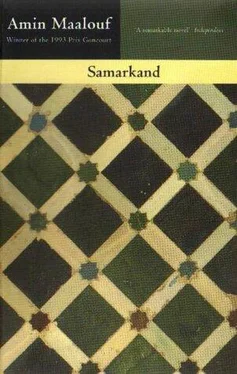I used this last phrase as the title of my best article. I was so imbued with the Princess’s enthusiasm that what I wrote was a real act of faith. The director of the Gazette suggested that I make it more balanced, but the readers approved of my ardour, judging by the ever-increasing number of letters I was receiving.
One of them bore the signature of a certain Howard C. Baskerville, a student at Princeton University in New Jersey. He had just received his BA and wanted to go to Persia to observe the events which I was describing. One of his expressions had stopped me in my tracks: ‘I bear the deep conviction that if, at the beginning of this century, the Orient does not manage to wake up, the West soon will not be able to sleep any more.’ In my reply I encouraged him to make this trip and promised to provide him, when he had made his decision, with the names of some friends who would be able to receive him.
A few weeks later, Baskerville came to Annapolis to tell me in person that he had obtained the position of teacher in Tabriz at the Memorial Boys’ School which was run by the American Presbyterian Mission; he was to teach young boys English and science. He was leaving immediately and requested advice and letters of recommendation. I eagerly congratulated him and promised, without thinking too much about it, to stop by and see him should I be in Persia.
I was not thinking of going there so soon. It was not that I lacked the desire to do so, but I was still hesitant about making the trip because of the spurious accusations which were hanging over me. Was I not considered an accomplice to a regicide? In spite of the rapid changes which had taken place in Teheran, I feared being arrested at the border because of some dusty warrant and not being able to notify my friends or my legation.
Baskerville’s departure nevertheless prodded me into taking some steps to straighten out my position. I had promised never to write to Shireen, and not wishing to risk the loss of her letters, I wrote to Fazel whose influence I knew to be growing daily. In the National Assembly where the big decisions were made he was the most sought-after deputy.
His answer reached me three months later. It was warm and friendly and most importantly it was accompanied by an official paper bearing the seal of the Ministry of Justice and stating that I had been cleared of all suspicion of complicity in the assassination of the old Shah and accordingly I was authorized to travel freely throughout all the provinces of Persia.
Without waiting a second longer I set off for Marseille and from there to Salonika and Constantinople and then Trebizond. Riding a mule, I skirted around Mount Ararat and finally reached Tabriz.
I arrived there a on a hot June day. I settled myself into the caravansary in the Armenian quarter as the sun was level with the roof-tops. However I was eager to see Baskerville as soon as I could, and with this intention I went off to the Presbyterian Mission which was a low sprawling building freshly painted brilliant white and set amongst a forest of apricot trees. There were two discreet crosses on the gate, and on the roof above the main doorway there was a banner studded with stars.
A Persian gardener came to meet me and take me to the office of the pastor who was a large red-haired man with a beard and the looks of a sailor. He gave me a firm and welcoming handshake. Before even asking me to take a seat he offered me a bed for the duration of my stay.
‘We have rooms which we keep prepared for our countrymen who surprise us and honour us with their visits. You are not being accorded any special treatment. I am just happy to be able to follow a custom which has been practised as long as this mission has been in existence.’
I expressed my sincere regrets.
‘I have already placed my baggage at the caravansary and I am planning to move on the day after tomorrow to Teheran.’
‘Tabriz deserves more than one hurried day. How can you come this far without agreeing to spend an idle day or two in the labyrinths of the largest bazaar in the orient or without going to see the ruins of the Blue Mosque which was mentioned in the Thousand and One Nights? Travellers are in too great a rush these days, in a rush to arrive — whatever it takes. But you do not arrive only at your destination. At every stage of the journey you arrive somewhere and with every step you can discover a hidden facet of our planet. All you have to do is look, wish, believe and love.’
He seemed sincerely upset that I was such a bad traveller and I felt obliged to justify myself.
‘In fact I have some urgent work to do in Teheran. I only made a detour via Tabriz in order to see a friend of mine who is teaching at your mission, Howard Baskerville.’
At the mere mention of this name the atmosphere became heavy. There was no more joviality, animation or paternal reproach. Only an embarrassed look which I took to be evasive and utter silence. Then he spoke:
‘Are you a friend of Howard’s?’
‘In a manner of speaking, I am responsible for his coming to Persia.’
‘What a heavy responsibility!’
In vain I tried to make out a smile on his lips. He seemed suddenly old and worn. His shoulders drooped and he seemed almost to be entreating me.
‘I have been running this mission for fifteen years. Our school is the best in the city and I go so far as to believe that our work is useful and Christian. Those who take part in our activities have at heart this country’s progress, otherwise, believe you me, nothing would force them to come so far in order to take on an environment which is often hostile.’
I had no reason to doubt him, but this man’s eagerness to defend himself put me off him. I had only been in his office for a few minutes, I had not accused him of anything and had not asked him for anything. I merely nodded politely. He continued:
‘When a missionary displays indifference towards the difficulties facing the Persians or when a teacher no longer derives any joy from his students’ progress, I strongly advise him to go back to the United States. Sometimes enthusiasm sags, above all with the younger teachers. What could be more human?’
Having spoken this preamble, the reverend sat silent and his stubby hands nervously fingered his pipe. He seemed to be having difficulty in finding his words. I thought it my duty to make the task easier for him. I adopted my most detached tone:
‘Are you trying to say that Howard has become discouraged after these few months and that his love of the East has turned out to be a passing fancy?’
He jumped up.
‘Good Lord, no. Not Baskerville! I was trying to explain what happens occasionally with some of our recruits. With your friend it is the opposite and I am infinitely more worried by that. In one sense, he is the best teacher we have ever employed. His students are making wonderful progress, their parents swear by him and the mission has never received so many presents — sheep, chicken, halva — all in honour of Baskerville. The problem with him is that he refuses to behave like a foreigner. If he were just happy to dress like the people here, to live on pilau and to greet me in the vernacular of the country, I would have been happy to smile at all that. But Baskerville is not the sort of man who stops at appearances and he has thrown himself wholeheartedly into the political battle. In class he praises the constitution and encourages his students to criticize the Russians, the English and the Shah and the backward-looking mullahs. I even suspect him of being what they call here a ‘son of Adam’, that is to say a member of the secret societies.’
He sighed.
‘Yesterday morning a demonstration took place in front of our gate, led by two of the most eminent religious chiefs, demanding that Baskerville leave or, failing that, purely and simply that the mission close down. Three hours later another demonstration broke out in the same spot in support of Howard demanding that he be kept on. You must understand that if a conflict like this goes on we will not be able to stay in this city much longer.’
Читать дальше












